A recent global survey carried out by Gallup with a consortium of other pollsters paints an interesting picture of the US, as seen by residents of ten European countries: Germany, France, Italy, Netherlands, Poland, Portugal, Slovakia, Spain, Turkey, the UK, and by Americans themselves. Some interesting findings:
- Two thirds of Americans think their expenditures on defense are too high, whereas only 60% of Europeans think their own defense expenditures are too high.
- Three fourths of those surveyed in almost every country believe that immigration constitutes a “serious threat” to national security
- Three fourths of those surveyed in almost every country have a “mostly favourable” opinion of the UN, and about two thirds in every country believe NATO is “still essential” to security
- 60% of Europeans and 70% of Americans believe that Europeans and Americans share similar values.
- “In light of Iraq”, two thirds of Americans believe the US and Europe should work in closer partnership, while two thirds of Europeans believe Europe should “take a more independent approach” to foreign and diplomatic affairs.
- Excluding Germany, about two thirds of Europeans support military intervention to stop a civil war, while a small majority of Germans and Americans would be opposed to such intervention. And while over 80% of Europeans (including Germans) support deploying peacekeeping troops after a civil war, only two thirds of Americans do. This suggests that a significant percentage of Americans who supported the Iraq invasion would oppose using those same troops to keep the peace in another country, which must take some mental gymnastics to reconcile.
- Excluding Germany, a small majority of Europeans and Americans would support military intervention to remove a government that abuses human rights.
- A majority of those in Poland, Portugal and Turkey are opposed to continued presence of their country’s troops in Afghanistan, while Slovakians would object to their country sending troops. A small majority of other Europeans, and nearly three fourths of Americans, support their country’s continued presence in Afghanistan.
- A majority of those in Italy, Poland, Portugal and Slovakia are opposed to continued presence of their country’s troops in Iraq, while the people of France, Germany, Spain and Turkey overwhelmingly support their leaders’ decision not to send troops or (in Spain’s case) to withdraw troops. Continued presence of troops in Iraq is supported only in the UK (52%), Netherlands (59%) and the US (59%).
- Participation in an international peacekeeping and reconstruction force in Iraq under UN command would be supported by those in every country except Turkey and Poland. However, if the force was under US control, only four European countries (UK, Italy, Netherlands, Portugal) would approve of their country’s participation.
- By an overwhelming majority in Europe, and by a 2:1 margin in the US, people agree that military action in Iraq has increased, rather than decreased, the threat of terrorism.
- About two thirds of the people of all countries surveyed except Germany, Poland, Slovakia and Turkey (which would be opposed) would support UN-approved intervention to establish peace in an African nation. Only a slim majority of Americans would support such intervention without UN approval, while all other countries would be opposed,
Except for their opinion of Israel and the US, Europeans and Americans have surprisingly similar opinions of the “institutions and people” of the rest of the world, and both Europeans’ and Americans’ opinions of each other rank second only to their opinion of themselves. Only the Spaniards (mean score 42%) and Turks (28%) had majority unfavourable opinions of Americans.
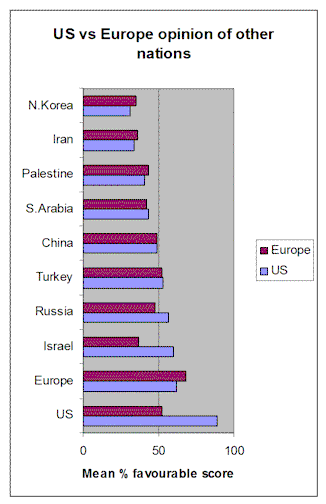
Contrast this largely favourable opinion of America’s institutions and people with their approval ratings for Bush:
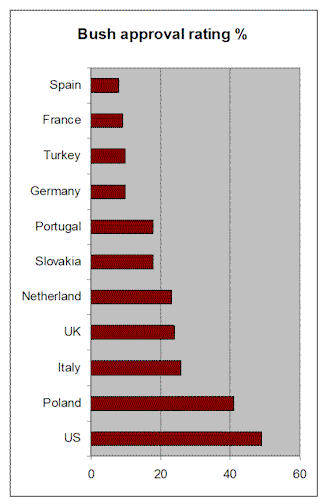
The weighted overall European approval rating for Bush is 16%.
I thought this was interesting: Here’s the proportion of people in each country that believe military intervention would be warranted to ensure the supply of oil to their country. What are we to make of this?
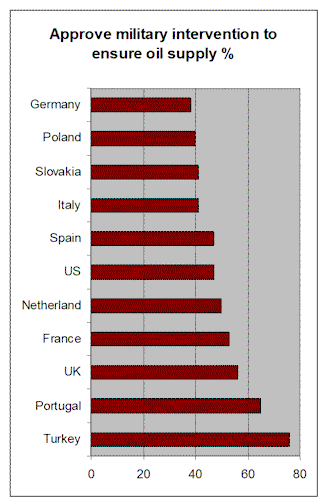
On the pivotal question of the wisdom of invading Iraq, the consensus is overwhelmingly that it was unwise, with the difference between countries being one of degree only. The question was “Was the war in Iraq worth the loss in human life and other costs”. Percentage saying yes:
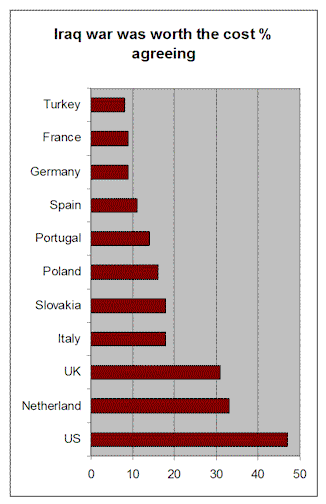
This next chart tells an interesting story about each country’s history and culture: Might versus right. Note the strong divergence between Spain and neighbouring Portugal.
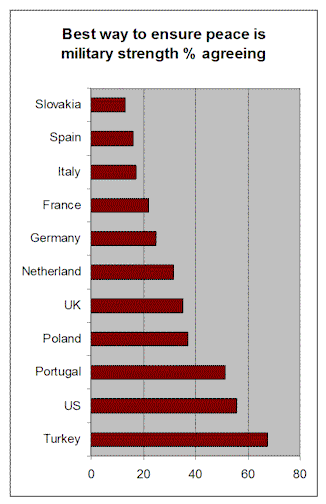
Contrast the last chart with this one, which shows a roughly 50-50 split of opinion in each country, with little difference between countries. The question is “Do you agree that providing economic aid to raise living standards in countries where terrorists are recruited is the most appropriate way to fight terrorism?”:
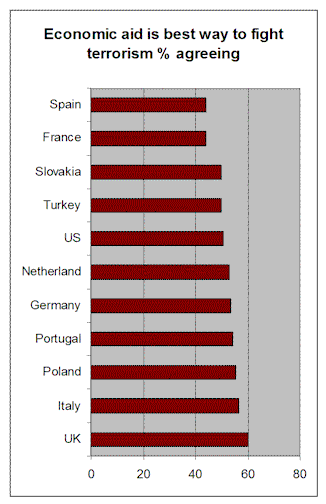
I’m not sure what to make of this either. It suggests we have a lot of education to do, anyway.
Finally, here are the issues that voters in each area consider most important in deciding which party to support in their next election:
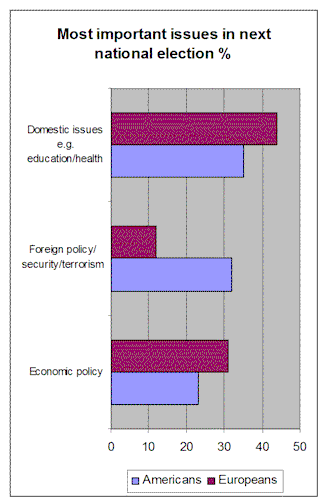
There is little difference among European nations in answers to this question, including those nations that have a much longer history dealing with terrorism than the US. To me this suggests that Europeans have moved on to issues that they can really control, while many Americans continue to be victimized by the fear-mongering of the politicians and mainstream media.
Make of it what you will, I thought it was an interesting exercise in gauging The Wisdom of Crowds.
Addendum 8pm: A final question in the survey asked people to place themselves on a political spectrum from extreme left to extreme right (in the US, the wording was “extremely liberal to extremely conservative”), using a seven point scale, with 4 being centrist/moderate. From left to right, here are the average country self-assessments, and the index of polarization (percentage rating themselves 1, 2, 6 or 7). Overall, and in almost every country, the curve was almost perfectly normally distributed (i.e. a bell curve), with most people calling themselves moderates, and about an equal number of left-of-centre and right-of-centre respondents:
|
Average (1-7)
|
Polarization (%)
|
France
|
3.8
|
16
|
Italy
|
3.8
|
18
|
Germany
|
3.8
|
17
|
Spain
|
3.9
|
25
|
Portugal
|
3.9
|
31
|
Slovakia
|
3.9
|
20
|
Netherlands
|
4.0
|
17
|
UK
|
4.2
|
16
|
US
|
4.2
|
27
|
Poland
|
4.4
|
31
|
Turkey
|
4.7
|
37
|
|












Dave, you might be quite interested in Ronald Inglehart’s work; you’ll find some at: http://wvs.isr.umich.edu/fig.shtmlYou’ll find more at World Values Survey site: http://www.worldvaluessurvey.org/Unfortunately I’m reluctant to take anything Gallup says at face value these days; they may be right (and other participating pollsters may keep them honest), but the weirdness of Gallup’s work on the U.S. presidential campaigns cuts into my confidence in Gallup.
It’s the definition of “moderate” that tends to change. The oil question tells me that people would rather not be inconvenienced, even at the cost of, you know, lives.
I have the same reservations about the data. Fer instance: the UK and US at the same point on the political spectrum? I don’t think so.
Rayne: Interesting stuff. Given the survey results I highlighted last year about the vast difference in values between Americans and Canadians, I’m a big skeptical of Inglehart’s findings that our values by global standards are virtually identical. Nevertheless, the map is intriguing. Maybe he’s just lumped some things together that have obscured important differences. I’ll have to read more.Renee: Boy, you’re a cynic. To me these findings indicate that people see nothing morally wrong with invading another soveriegn nation to protect their own economic self-interest. I think that’s very disturbing.David: I don’t think so either. But this is people’s self-assessment, not an objective one. What I’ve seen from other surveys suggests that those in the 18-39 age group consider themselves more conservative than do those in the 40-59 age group. Is it possible Britain’s young people are throwbacks to older and less liberated thinking? And if so, why might that be?
Dave – I wonder whether as an aggregation the entirety of Canada may be more like the U.S. than not, but separated by party Canadians may be farther spread apart. Your equivalent of our Greens may be farther out, for example. We’re also comparing a nation with a truer multiparty system to one that is more nearly a single-party system masquerading as a two-party system. The distribution is probably quite similar under the bell curve, but the parties fragment and express themselves differently.Here’s a link I’ve been pondering on for a future post: http://www.integralnaked.org/live/view_integralpolitics.aspx — watch the clip of Ken Wilber discussing the divergence of conservatism and progressivism and evaluate against Canadian society. (You may need to do a crash intro to Gravesian psychology, Spiral Dynamics and Wilber’s theory of transpersonal psychology to catch all of it.)In the US there’s a clearer line between the self-identifying conservatives and progressives; perhaps it’s merely less obvious in Canada, more of a matrix than separate silos.(As for Renee’s comment and your reply – looks like to-may-toe, to-mah-toe from where I’m at…)
Rayne: The Wilber speech is interesting, especially when he makes the point that Clinton made the first strides for integration by proposing programs that called for a mix of opportunity (created by the state) and responsibility (provided/required by the individual). Alas, all of the key Integral Politics information, especially the explanation of the ‘colours’, is hidden behind a firewall you can’t get at without providing a credit card and paying a fee. I’d be interested in learning more about his Purple and Beige worldviews especially, which he doesn’t talk about in the ‘free’ speech. As for Canada/US differences, I’ve written two posts on these, and I didn’t hear anything from Wilber that causes me to believe these stark differences can be easily rationalized away:(1) Why Canadians fear America: here (2) Are You a Closet Canadian: here